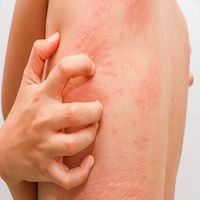Article
Four Simple Tests Can Improve Autoimmune Urticaria Diagnosis
Author(s):
Researchers highlight a new set of tests that could streamline the process involved in identifying autoimmune chronic urticaria.

Researchers from Hungary’s University of Debrecen outlined a more effective process for identifying autoimmune chronic urticaria (AIU).
Specifically, study author Krisztina Hajdu, MD, PhD, and team listed several parameters that showed significant diagnostic improvement in both sensitivity and specificity when used in combination with the autologous serum skin test (ASST).
The researchers found that ASST positivity, the occurrence of symptoms at night, angioedema, incidence of more than five symptomatic days per week, and anti-thyroid antibody positivity were more frequent in the AIU group versus patients with chronic spontaneous non-AIU. These parameters were defined as specific to AIU.
Since its initial 1986 use by Grattan et al to differentiate autoimmune urticaria from chronic idiopathic urticaria (CIU), ASST has become a standard screening method for AIU despite known diagnostic weaknesses.
“One major limitation of ASST is that positivity can refer not just to the presence of functional autoantibodies against FcεRIα or IgE, but [also to] other yet unidentified serum factors,” wrote the authors.
For the study, the team evaluated 55 chronic spontaneous urticaria patients using a questionnaire and laboratory testing.
The team used a scoring system described by Breneman et al to plot the severity of urticarial. AIU was diagnosed according to the basophil CD63 assay positivity.
Interestingly, an AIU diagnosis testing by ASST alone proved sensitivity of 88% and specificity of 77%. The combined battery of the chosen determinant factors and ASST resulted in the most accurate results proving 97% sensitivity and 86% specificity.
"It would be worth adding the inexpensive and simple ASST to the routine test section with the combination of thyroid laboratory tests and anamnestic/clinical data to facilitate the diagnosis of AIU," wrote Hajdu. "This easy to use, combined test can be used for the diagnosis of AIU in outpatient settings also."
The article, “A simple combined test can improve the diagnosis of autoimmune urticaria, was published in the British Journal of Dermatology.
Related Coverage:
Urticaria: Varied Presentations and Clinical Trajectories
Skin Test Can Predict Remissions in Urticaria
Developing New Treatments for Urticaria and Looking Toward the Future





